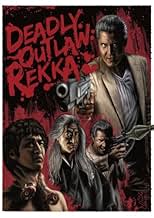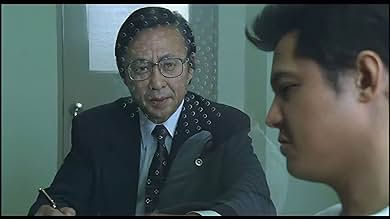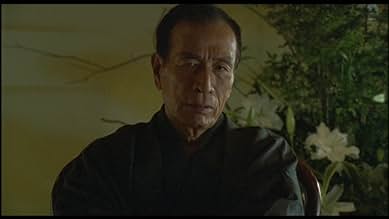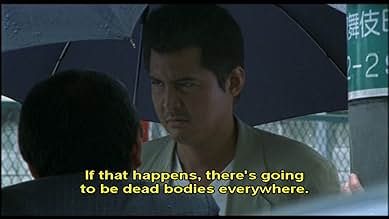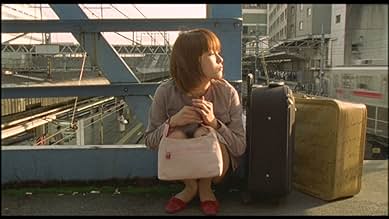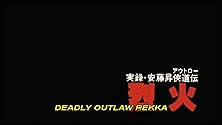Jitsuroku Andô Noboru kyôdô-den: Rekka
- 2002
- 1h 36min
NOTE IMDb
6,7/10
1,8 k
MA NOTE
Ajouter une intrigue dans votre langueWhen his beloved boss is killed, a dangerous young gangster cuts a path of vengeance through the Japanese mafia.When his beloved boss is killed, a dangerous young gangster cuts a path of vengeance through the Japanese mafia.When his beloved boss is killed, a dangerous young gangster cuts a path of vengeance through the Japanese mafia.
- Réalisation
- Scénario
- Casting principal
Avis à la une
excerpt, more at my location - A yakuza film is bread and butter for Takashi Miike, and Deadly Outlaw: Rekka (Jitsuroku Andô Noboru kyôdô-den: Rekka), sandwiched between the sadistic violence of Ichi The Killer and the surrealism of Gozu, is surprisingly ordinary when compared with much of the director's oeuvre. However, the straightforward nature of this 2002 film is the essence of its charm.
Deadly Outlaw: Rekka is such unabashed fun it will leave you feeling indulgent and sporting a maniacal grin from start to finish, just like the one, you might imagine subsequent to viewing, Miike wore while making it. Concentrated to an hour-and-a-half, as so few recent films are, it hits you like a shot of pure audio-visual entertainment straight in the arm.
Deadly Outlaw: Rekka is such unabashed fun it will leave you feeling indulgent and sporting a maniacal grin from start to finish, just like the one, you might imagine subsequent to viewing, Miike wore while making it. Concentrated to an hour-and-a-half, as so few recent films are, it hits you like a shot of pure audio-visual entertainment straight in the arm.
Miike makes another yakuza picture. It's not especially groundbreaking, and it's certainly not one of Miike's deeper films, but it is extremely entertaining. That's mostly because of the main character, Kunisada (Miike regular Riki Takeuchi), who is the most psychopathic character in Japanese movies since Tatsuya Nakadai's evil samurai in Sword of Doom. Kunisada's mob boss, his surrogate father, is ambushed and murdered (though not before nearly strangling his assailant to death; the hit-man only lives because he cuts the dead man's hands off as they clench around his windpipe). Simultaneously, Kunisada, almost as if through a psychic bond, breaks out of jail and starts to go against the rival gang. The only problem is that the boss's death isn't necessarily a bad thing from his own gang's perspective. They and their rival gang try desperately to make a truce. Unfortunately for everyone, except for a small handful of loyal comrades, Kunisada won't stop until everyone around him is dead. The film suffers from Miike's major flaw as a filmmaker: a lack of coherency. There seem to be dozens of named characters, and it becomes very difficult to sort out who everyone is. I had to watch key scenes a second time to piece it all together (though I had most of it straight by the end of the film). But, even if you never quite figure it out, Miike's patented break-neck action sequences are so outrageously done that the film is more than worth watching. Watch out when Kunisada finds a rocket launcher!
Those of you that are used to American-style movies, don't watch this because you're probably going to be bored. People, like me, who are used to weird Japanese movie-styles will mildly enjoy this movie. The editing is very strange, sometimes you get the impression that your DVD has skipped, the sound is also weird in some places, I can't explain exactly what's wrong with it but watch this film and you'll know what I mean.
I recently watched "Imprint". That's an episode in the "Masters Of Horror"-series directed by Takashi Miike. THAT's what I call a strong and violent film. It was awesome!
Don't expect too much and you will be entertained. But not as much as you expected. A decent watch. Nothing to keep.
I recently watched "Imprint". That's an episode in the "Masters Of Horror"-series directed by Takashi Miike. THAT's what I call a strong and violent film. It was awesome!
Don't expect too much and you will be entertained. But not as much as you expected. A decent watch. Nothing to keep.
Miike shows us in this film his outstanding gift for the yakuza genre from the first minute to the last. This time he adds a soundtrack from the Flower Traveling Band, Satori, a Doom Metal key album from 1971 that makes those master shoots, of perfect color, shine without stopping during the cinematographic experience he proposes.
His characters flow before the viewer like a handful of impossible to stop Japanese scarfaces. Shinjuku, mafia, escorts, magic and Rock and Roll !!
DEADLY OUTLAW: REKKA is a rare misfire from the usually interesting Takashi Miike, who can typically be relied upon from making outrageously entertaining movies. This is a standard Yakuza movie, featuring a low rent thug who decides to go on an odyssey of revenge, yet despite a few moments of surrealism and violence you can't really tell it's a Miike film at all.
Instead it has more in common with low budget art-house fare, featuring interchangeable characters and some padded scenes of characters wandering the streets aimlessly at night. Oh, there's bound to be a brutal fight scene or execution around the next corner, but there isn't anything that makes you care about what's going on. Okay, I don't watch a Miike film for the characterisation, but at least ICHI THE KILLER had tons of incident and AUDITION's slow build worked when matched with THAT ending.
This one's predictable in the extreme, I couldn't care less about the characters, and the whole 'stone face' type of acting is just a bit dull. Miike tries to spice things up with a sex scene here and a mutilation there, but it isn't enough; for much of the running time, I was simply bored. DEADLY OUTLAW: REKKA does have the same kind of hustle and vibe as the early gangster films of Beat Takeshi, but it lacks their finesse and raw power. Attempts to make it feel like an old-fashioned grindhouse movie of the 1970s don't really gel either; instead this movie is both slight and forgettable.
Instead it has more in common with low budget art-house fare, featuring interchangeable characters and some padded scenes of characters wandering the streets aimlessly at night. Oh, there's bound to be a brutal fight scene or execution around the next corner, but there isn't anything that makes you care about what's going on. Okay, I don't watch a Miike film for the characterisation, but at least ICHI THE KILLER had tons of incident and AUDITION's slow build worked when matched with THAT ending.
This one's predictable in the extreme, I couldn't care less about the characters, and the whole 'stone face' type of acting is just a bit dull. Miike tries to spice things up with a sex scene here and a mutilation there, but it isn't enough; for much of the running time, I was simply bored. DEADLY OUTLAW: REKKA does have the same kind of hustle and vibe as the early gangster films of Beat Takeshi, but it lacks their finesse and raw power. Attempts to make it feel like an old-fashioned grindhouse movie of the 1970s don't really gel either; instead this movie is both slight and forgettable.
Le saviez-vous
- AnecdotesTakashi Miike cut this movie to the strains of the 1971 progressive rock album "Satori" by the Flower Traveling Band, which he learned of through costars Joe Yamanaka and Yûya Uchida, who were also the band's founding members. Miike found the album to be way ahead of its time and was delighted at how well and inconspicuously it cut into a movie made 30 years later.
- GaffesAt 35:52 the shadow of someone holding a hand-held camera can be seen.
- ConnexionsReferenced in Rewind This! (2013)
Meilleurs choix
Connectez-vous pour évaluer et suivre la liste de favoris afin de recevoir des recommandations personnalisées
Détails
- Date de sortie
- Pays d’origine
- Site officiel
- Langue
- Aussi connu sous le nom de
- Deadly Outlaw: Rekka
- Société de production
- Voir plus de crédits d'entreprise sur IMDbPro
- Durée
- 1h 36min(96 min)
- Couleur
Contribuer à cette page
Suggérer une modification ou ajouter du contenu manquant

